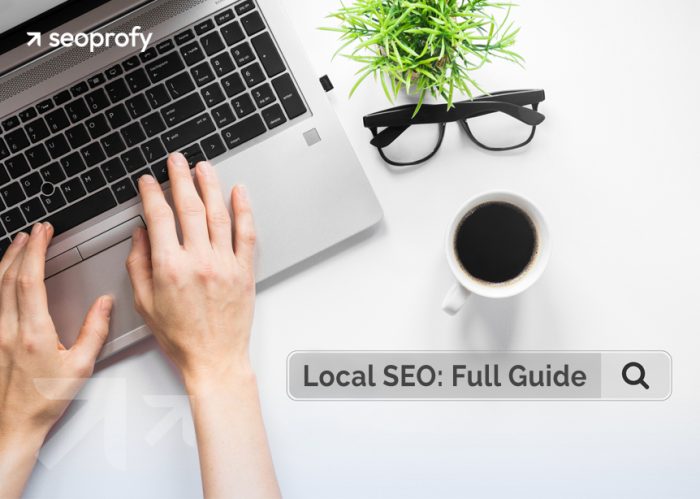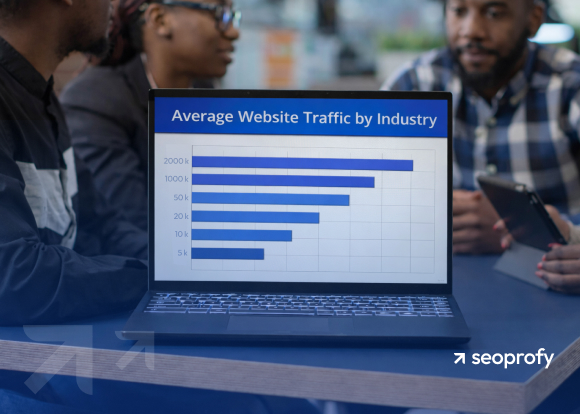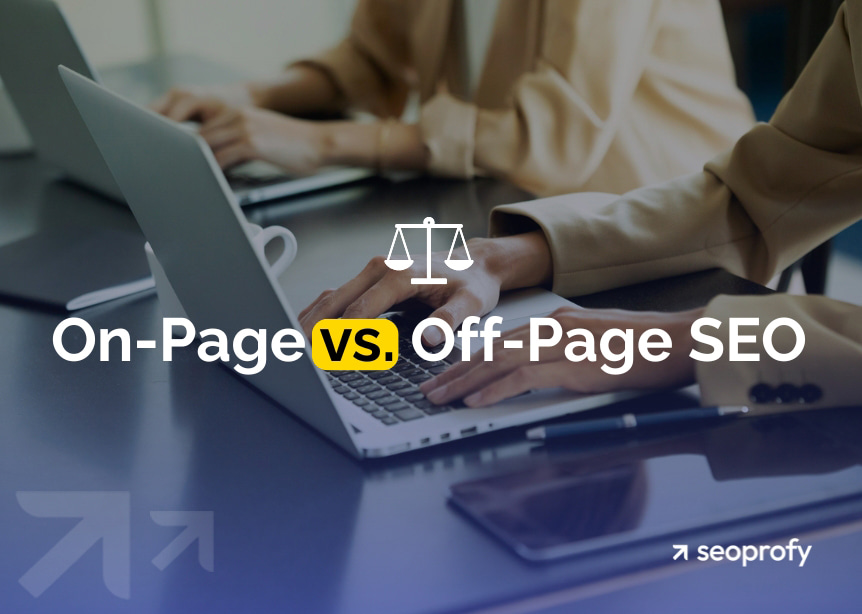Reaching customers in your area is a key goal for any local business. Whether you run a law firm or a dental clinic, you need to develop a strategy to attract potential customers. Luckily, you can opt for time-tested local SEO techniques to stand out from the crowd!
Search engine optimization (SEO) can help you increase your company’s presence in search results and Google Maps, outranking your competitors and increasing revenue. In our local SEO guide, you’ll find the most efficient practices that will boost your business visibility and ensure the growth of your loyal customer base.
- The company’s name, address, and phone number play a significant role in the site’s design for a local business.
- Relevance, distance, and prominence are the key ranking factors for local SEO.
- Detailed information about your business increases the chances that your prospective customers will visit your brick-and-mortar shop by 70%.
- 92% of people believe that responding to customer reviews is a part of great customer service.
What Is Local SEO?
Local search engine optimization is a set of practices focused on improving a business’s online presence to increase its visibility on search engines like Google. These techniques help potential customers in your region find your company more quickly, leading to greater brand awareness, increased sales, and enhanced authority.
Consider that most modern users typically use the internet to search for providers of specific services or products nearest to them. At the same time, only 9% of them will scroll down to the bottom of the first page of local search results. So, the lower your site is from the top, the higher the chance that consumers simply won’t see it.
Luckily, with professional local SEO services, the next time a user googles the services or products you offer, they’ll surely see your profile or website. Moreover, if you offer them comprehensive information about your business, the chance they’ll visit your brick-and-mortar shop or company is 70%!
Although SEO for local companies includes all the processes inherent to usual search engine optimization, there are still some noteworthy differences between them.
|
Local SEO |
Usual SEO |
|
| Target audience | Local consumers | National or worldwide audience |
| Keywords | Business-related keywords and phrases that are searchable in a certain area. | Keywords and phrases related to products and services without geographical bonding. |
| Competition | Usually, up to 2-3 major opponents. | Hundreds of competitors. |
| Website design | Design places a big emphasis on the business’s name, address, and phone number. | The site highlights an opportunity to purchase products and services online. |
The Basics of a Local SEO Strategy
Probably, you’re wondering now how to improve local SEO to make your business flourish. This process involves several key components that will lay the foundation for your success. Understanding the following cornerstones while developing an SEO strategy is essential to ensure a successful increase in organic traffic and online visibility:
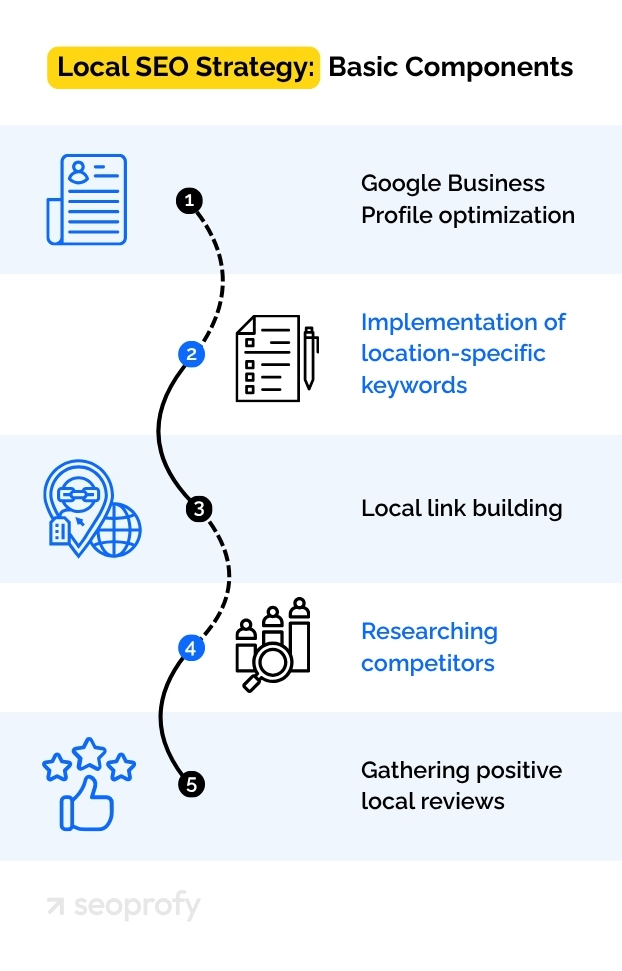
- Google Business Profile optimization: Local businesses need to keep their company information up to date to increase their chances of ranking higher in search results and Google Maps.
- Implementation of location-specific keywords: Weave terms and phrases related to your target area to boost your local SEO ranking and attract more customers from a specific region.
- Local link building: Getting listed on local citation websites and directories is a great way to not only improve your backlink profile but also boost your authority and visibility.
- Researching competitors: Keeping an eye on your opponents is a sure way for local companies to discover missed opportunities, avoid common mistakes, and notice new trends in your region.
- Gathering positive local reviews: According to our local SEO statistics, 42% of users regularly read online reviews when searching for businesses nearby. Considering this, you should always encourage your clients to leave positive feedback on your products or services.
How Local SEO Works: Key Ranking Factors
Implementing an efficient local SEO strategy will help Google better understand your business’s location, reputation, and offerings. The search engine will be able to recommend your service or products more accurately.
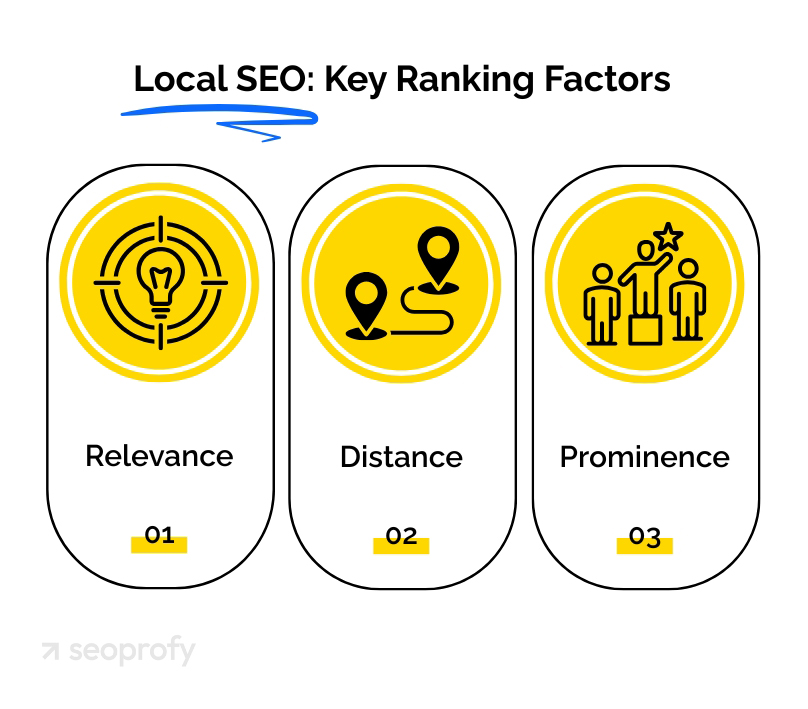
Consider that Google uses specific local SEO ranking factors while ranking different brick-and-mortar businesses on Google Maps. As a rule, its algorithms consider:
- Relevance: Whether your services or products match the user’s search intent.
- Distance: Whether your business is located near the user.
- Prominence: Whether your company or shop has positive reviews from other consumers.
Thus, if your business perfectly matches all the mentioned local ranking factors, there is a strong chance that it will be the first in the “near me” searches conducted by a specific user.
Local SEO Tips & Best Practices
Developing effective local SEO strategies requires thorough planning, consideration of the latest trends, and the implementation of proven techniques. The tips provided below will help you manage this challenging process and level up your business, increasing your income and attracting more prospective customers.
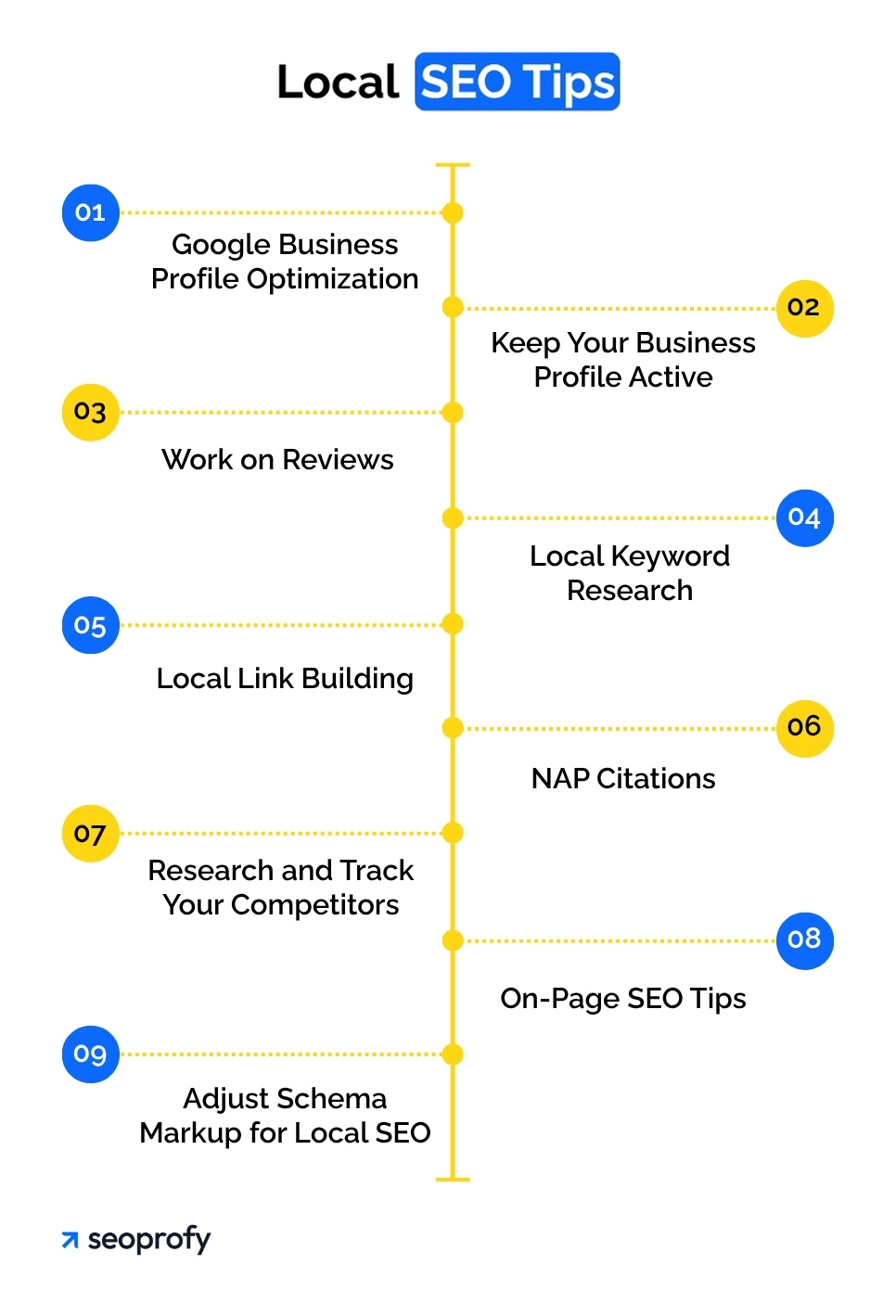
Google Business Profile Optimization
Before you dive deep into search engine optimization, focusing on your Google Business Profile (GBP) should be the top priority in your local SEO checklist. First, check whether there are any keywords related to your niche in its name.
For instance, if you run a law firm, it’s better not to come up with a profile titled “Latham & Levelle — Chicago Law Firm” because there is a chance that Google will get it banned for spamming the keyword “Chicago Law Firm.” Thus, it’s strongly recommended to include only your business name. By the way, if you work in the legal sector and want to find new business opportunities, you’re welcome to check our local SEO guide for lawyers.
In addition, make sure to mention other important details, such as your working hours, services or products, and contact information. Adding high-quality photos is important, as they also contribute to your Business Profile’s authority and play a significant role in the conversion process.
Moreover, companies with attractive images are more likely to appear in the Google three-pack. This feature displays the top three business listings as an answer to a local search query. If you don’t know what photos to post, here are some ideas:
- The interior and exterior of your brick-and-mortar business.
- Your most popular products.
- The working processes.
- Your company’s vehicles or uniforms.
- Before/after images.
Once you implement these tips, there’s a higher chance that Google will add you to its three-pack. For instance, here is how it looks for the “Chicago lawyers” search request:
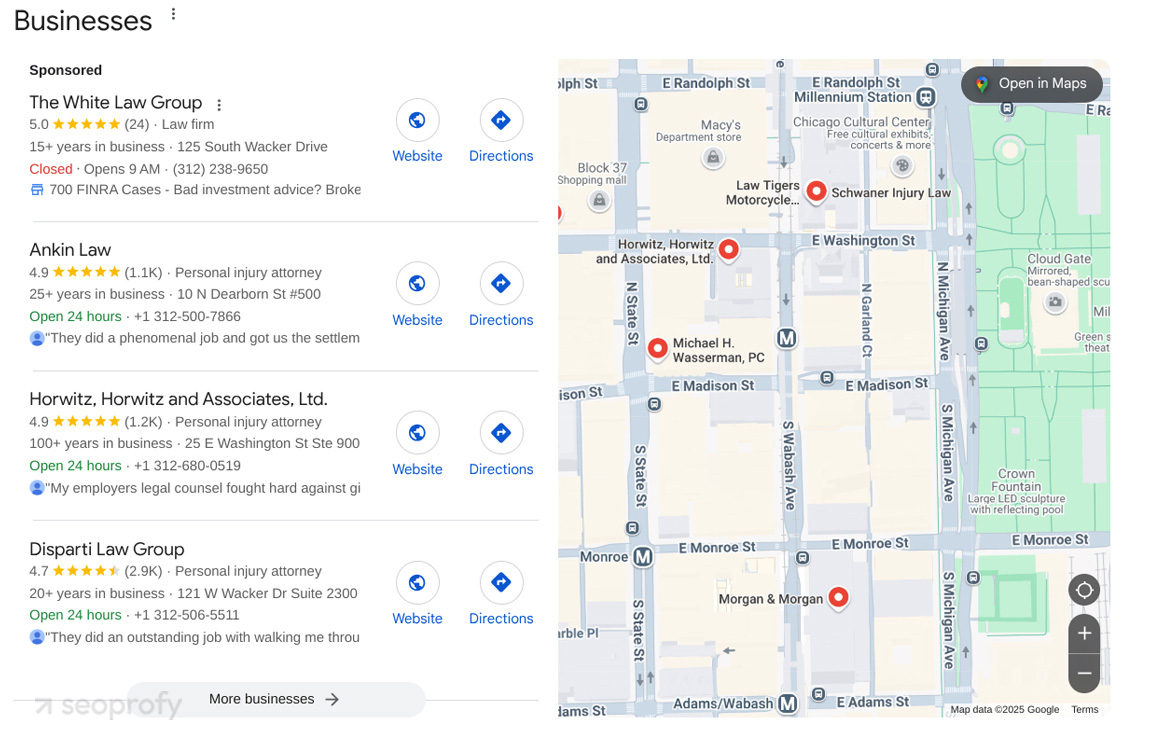
Keep Your Business Profile Active
Once you’ve established a strong Google Business Profile, it’s time to start actively managing it so you can reach the top of the local map pack rankings. Regularly posts the news about events and special promotions offered by your business. For instance, you can announce new products in your shop, a seasonal menu at a restaurant, or updated pricing for your services.
Also, one of the best practices for local SEO involves interacting with your clients via the Q&A section by answering their questions. Thus, you can tell your prospective customers more about your offers and encourage them to make a purchase.
Additionally, when you make changes to your brick-and-mortar business, you also need to update your GBP. For example, it may be the information about holidays or a new working schedule.
Work on Reviews
Online reputation management is extremely essential for achieving your main business and SEO goals. Your clients’ reviews not only influence your rankings but also can improve your authority by showing a pleasant customer experience. Conversely, if your business continues to receive negative feedback, this will harm its visibility in the local pack and cause significant damage to your reputation.
However, it’s not enough to read your customers’ reviews on Google, Yelp, NextDoor, and other platforms. You also need to answer them to show that you care about the client’s experience. Moreover, according to recent research, nearly 92% of consumers believe that responding to local business reviews is a part of providing great customer service.
So, how can you encourage your clients to leave positive feedback? Follow the practices offered by Google:
- Encourage your customers to leave feedback. You can use Google Business Manager to create a review link and share it with your clients.
- Never buy positive reviews. Google uses advanced AI to detect and delete fake customer reviews.
- Don’t remove negative comments. Consider that customers are more likely to trust a mix of positive and negative reviews. Nonetheless, you should still do your best to stay around four out of five stars on Google Maps.
Also, consider that there is no exact number of reviews you need to get to overcome the competitors. However, you’ll surely boost your local SEO efforts if you manage to obtain more comments from your customers than your primary business opponents.
Local Keyword Research
You can’t develop an SEO strategy that will boost your sales and increase the website’s organic traffic without proper keyword research. This process involves discovering the words and phrases that people use to find the services and products related to your niche online. For example, if you provide legal services in Chicago, some users may find you by googling “lawyer,” while others may opt for “legal services Chicago.” In both cases, we have people who may potentially become your clients if a local search algorithm shows them your site.
First, you need to brainstorm as many keywords related to your services or products as possible. Don’t forget to add all of them to a list. Once you’re done, you can opt for advanced SEO tools like Ahrefs. This platform is ideal for choosing keywords relevant to your business. Add the words from your list to Ahrefs’ Keywords Explorer and check the Matching terms report. For instance, if you run a law company and add terms like “law firm near me,” “legal services,” etc., you’ll get a significant expansion for your list:

Review the received list to select the keywords that are missing from your list. Also, pay attention to the following metrics:
- Keyword Difficulty (KD): The higher this metric, the more difficult it’ll be to rank on the first page of Google for a certain keyword. As a rule, local keywords have lower KD.
- Volume: This metric refers to the number of times a user enters a specific keyword into a search engine each month.
- Traffic Potential (TP): This theoretical sum estimates the monthly organic traffic that the #1 ranking page can receive from the keyword.
Consider that keyword research requires a meticulous analysis of your niche, local audience, and competitors. It’s easy to miss something and lose a lot of opportunities. Luckily, with our local SEO services and a custom strategy, you’ll be able to grow your online presence and successfully reach every potential customer in your area.
Local Link Building
Link building is one of the local SEO best practices, as it boosts your online visibility, drives traffic to your website, and enhances your authority. It involves getting the backlinks from reputable and popular websites related to your niche and local area. Thus, you can grow your backlink profile, making your website more reputable in the eyes of search engines, which eventually leads to higher rankings.
Local SEO link building typically focuses on obtaining valuable references from the following online resources:
- Online directories: These are websites that include information about local businesses of a certain type. For example, if you run a dental clinic in New York, you may be interested in getting mentioned by Yelp. In addition to valuable backlinks, implementing this local link building practice will also increase your chances of being noticed by potential clients.
- Review platforms: These online resources include information about your business, the link to your website, and your customers’ reviews. As a rule, people use them to check the reliability of a local business, and having high ratings on these platforms will surely boost your credibility. For instance, the owner of a restaurant from San Francisco should be mentioned on sites like Eater SF.
- Local PR: As a rule, local news sites are starving for interesting stories, so whenever your business organizes an exciting event (anniversary, re-opening, seminar, etc.), don’t forget to get in touch with reporters to cover it. Also, you can use X to find local PR opportunities. Just enter “looking to speak to” + “your city name” or “#journorequest + “your local area.” For example, here is how you can discover interesting opportunities in Chicago using this method:

Our SEO case studies highlight the importance of local link building in driving online traffic growth. Moreover, we understand that it’s important not only to obtain valuable links but also to review your backlink profile regularly to disavow the low-quality ones. Check how we improved the client site’s performance after implementing link building techniques in combination with other efficient tactics:

NAP Citations
Getting mentioned in NAP citations is also an important part of local SEO, as they include information about your business’s name, address, and phone number. The reason why you need to get consistent NAP citations on reputable websites is that Google uses them to check the information about your company.
As a rule, this information appears on the mentioned business directories or social media profiles. The best local SEO practices for managing your NAP citations involve the following:
- Add your business to national big data aggregators (for example, if you operate in the USA, consider Foursquare and Data Axle).
- Don’t focus only on Google (get listed in Apple Maps, Bing Places, Yellow Pages, etc.).
- Ensure that all your citations include similar information (if you need to change any details, you must do it on all platforms).
Hire our local SEO marketing team to level up your business performance. Our custom strategies and efficient techniques will help you:
- Boost your sales
- Expand your customer base
- Win the local competition
- Establish a popular and authoritative brand

Research and Track Your Competitors
While developing your local SEO strategy, it’s essential to keep an eye on your business opponents. First, identify the websites that outrank yours in search results and pay attention to the techniques they use. At this stage, you should focus on the following areas:
- Site’s structure: Pay attention to the way your competitors organize their service and product listings. Check which categories are missing from your website that are present on theirs. Plus, estimate the overall user journey and navigation.
- Keywords: You can use Ahrefs to identify the keywords used by your competitors. However, consider that if you run a new local business, it’s better to avoid opting for highly competitive keywords and focus on more specific terms. For example, instead of a general “law company Chicago,” you can target “best family law firm Chicago.”
- Google Business Profile: Explore how your competitors manage their GBPs. Pay attention to their main and secondary business categories, the number of reviews they have, and the completeness of their profiles.
Also, you can estimate the overall performance of their websites by exploring monthly traffic, average CTR, and other metrics. Using this data, you can define the relevant metrics and set numerical targets for measuring SEO efforts. If you notice that the implemented techniques don’t help your website reach the typical results for your industry in a certain area, it’s a clear sign that you need to change your approach.
On-Page SEO Tips
To improve local SEO, focus on enhancing content, metadata, and internal linking. Analyze your website to ensure that its pages meet the following criteria:
- All URLs are descriptive and SEO-friendly
- The content is tailored to local intent
- NAP information is included on the most important pages
- All images are high-quality and optimized
- Meta titles and descriptions include the local keywords
- There are no broken internal links
Ensure that your site includes pages tailored specifically for local customers. For example, if you run a pet shop in Sacramento, you may focus on creating blog posts related to your area. It may be a good idea to entertain your clients with topics like “Best Places to Visit with Your Pets in Sacramento.” Thus, you’ll provide your potential customers with helpful information and increase your chances of attracting the people living in your target region.
If your company operates in multiple locations, focus on each one separately. Write unique content for customers from every target area, considering the particularities of the region (including local slang, events, etc.).
Also, you can use Ahrefs to discover local SEO trends and topics that truly matter to your potential customers. Open the Keyword Explorer tool and enter your service or product keyword and location. Select the toggles for “Top 10” and “Also talk about,” and you’ll see the frequently mentioned terms on the popular websites that rank for the keyword you’ve entered. Scroll through this list, analyzing which of these words you can use to create content related to your niche.

Of course, it may be difficult to deal with all the mentioned tasks on your own. Luckily, you can always opt for an outsourced SEO team so you can focus on more important business processes while they handle the rest.
Adjust Schema Markup for Local SEO
Finally, if you want to truly boost your SEO ROI and see your sales increase, you need to focus on adjusting schema markup. Adding this code to your site is essential if you want to help search algorithms understand your content better.
There is an entire page on Schema.org devoted to local businesses. Using the pieces of code, you can provide algorithms with information about currencies accepted by your company, its address, phone number, and more.
Once you manage to adjust the Schema markup during your local SEO campaign, Google will start providing your potential clients with extra details about your business. This information may include star ratings, phone numbers, prices, etc. It’ll be displayed directly in search results, so users can see valuable data even without visiting your site. For example, here, you can check a perfectly adjusted Schema markup of Horwitz, Horwitz and Associates, Ltd:

Popular SEO Tools for Local Business
You can’t efficiently boost your site without the best SEO tools. Of course, the choice of this or that platform directly depends on your budget and goals. Nonetheless, we strongly recommend the following local SEO tools:
- Semrush (Map Rank Tracker): Designed with powerful AI, this tool allows you to monitor your search positions in local rankings directly on a map of the areas for certain keywords.
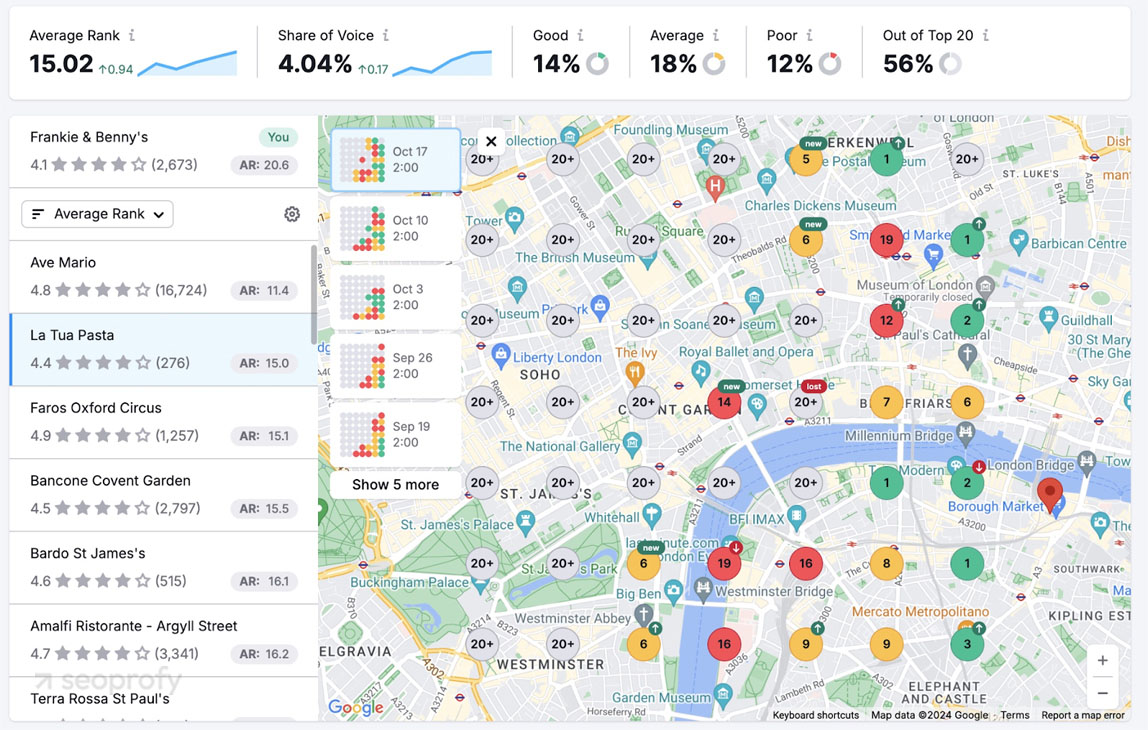
- Local Falcon: This powerful tool shows how often your business shows up in the Map Pack for a specific term and area. Moreover, its automated scanners and advanced AI recommendations can stand you in good stead while implementing an SEO strategy.

- Google Search Console: This essential platform allows you to measure your website’s search traffic, estimate its performance, and detect issues that may occur during the implementation of an SEO campaign.
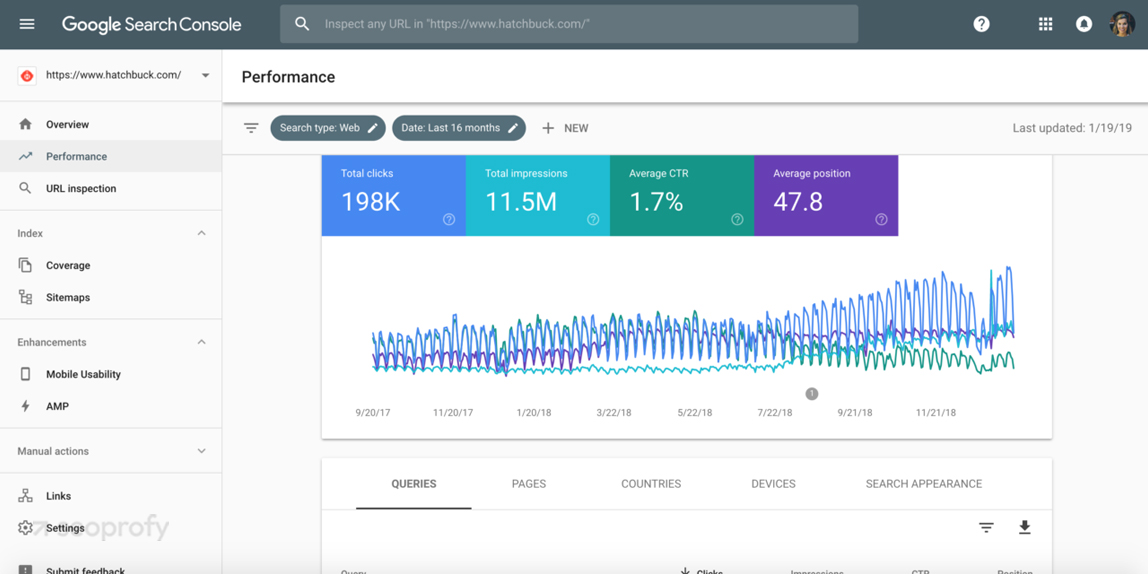
- Ahrefs (Rank Tracker): Using this tool, you can monitor your rankings across 190 countries, which is essential for estimating your business performance if it operates in several regions.
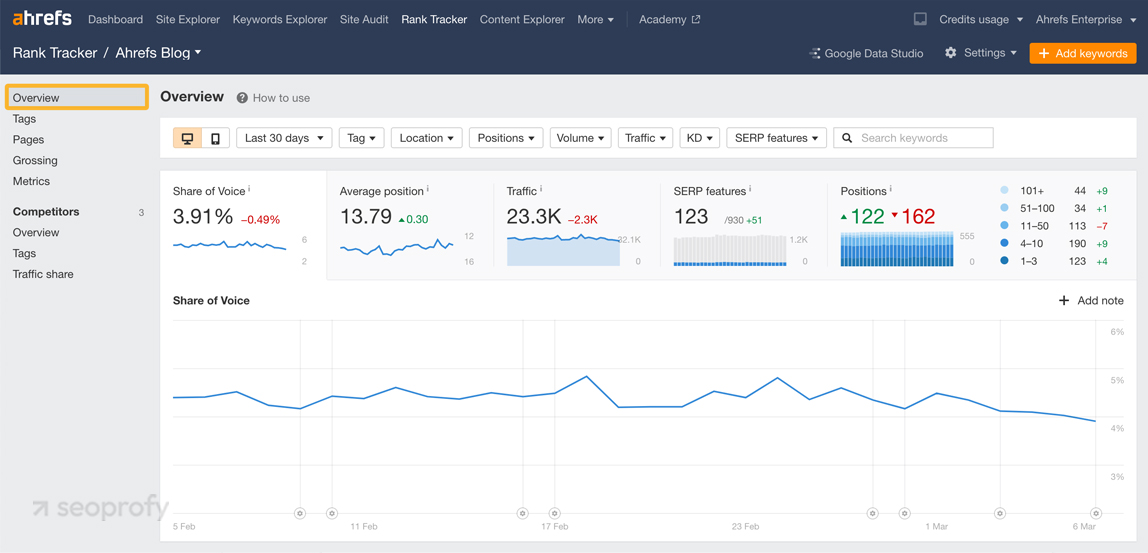
- Google Keyword Planner: This free tool is ideal for discovering new keywords related to your local business, estimating the traffic they can generate, and analyzing the costs to target them.
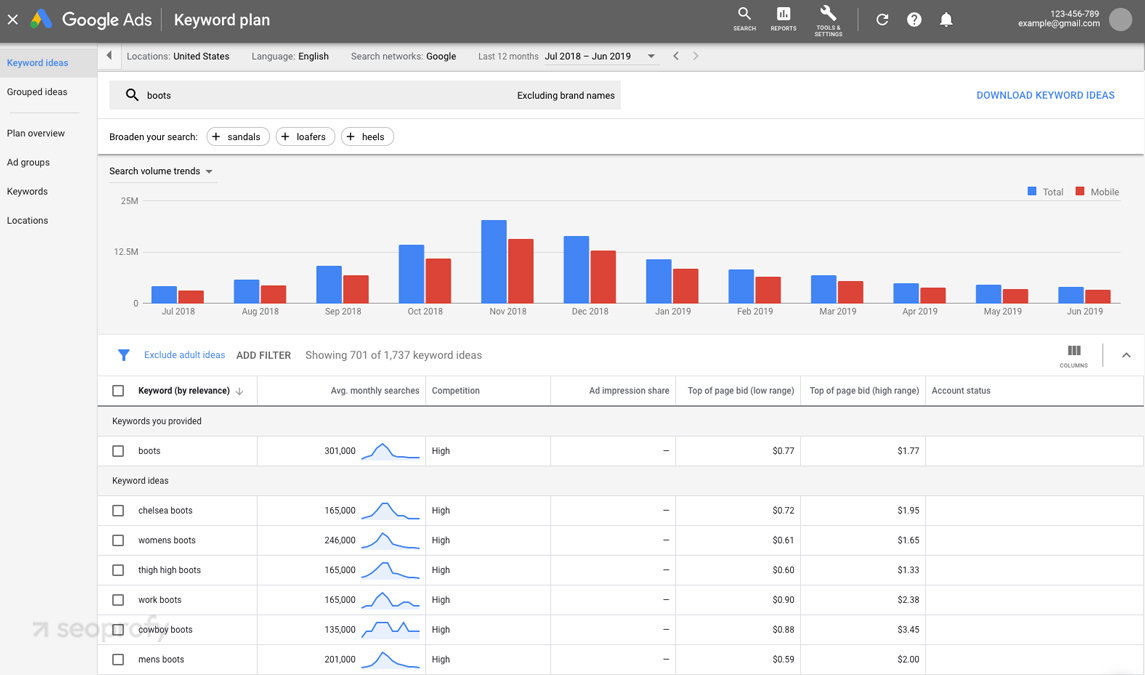
Improve Your Local Business Today
Now, you know how to do local SEO and successfully promote your business in a specific area. Due to our tips, you won’t simply boost your visibility on Google Maps but also establish a strong brand and increase your revenue.
At the same time, consider that it’s not only enough to implement the tactics from our guide to local SEO. Search optimization is an endless marathon that requires constant management, tracking, and adapting to new trends. Thus, if you need assistance, SeoProfy is always ready to lend a helping hand.

